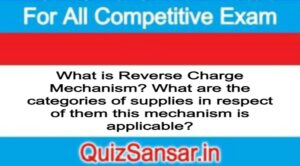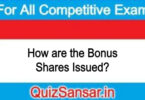
What is Reverse Charge Mechanism? What are the categories of supplies in respect of them this mechanism is applicable?
What is Reverse Charge Mechanism? What are the categories of supplies in respect of them this mechanism is applicable?
Ans.
Reverse Charge Mechanism (RCM)
Normally, the supplier of goods and/or services will be liable to discharge tax on the supplies effected. However, the Central or State Governments upon recommendation of the GST Council are empowered to specify by notification the categories of supplies in respect of which the recipient of goods and/or services will be liable to discharge the tax.
All the provisions of the CGST Act, will apply to the recipient of such goods and/or services, as if the recipient is the supplier of such goods and/or services-viz., for the limited purpose of such transaction, the recipient would be deemed to be the ‘supplier’.
Under Section 9(4) of the CGST Act and Section 5(4) of the IGST Act, 2017 when any registered taxable persons receive any supply from unregistered person, be shall be required to pay tax on such inward supplies under ‘Reverse Charge Mechanism’.
Example- Mr. A is not registered in GST as his aggregate turnover of taxable supplies is below threshold limit. Mr. B purchased goods from Mr. A, in such case, Mr. B would be required to pay tax under reverse charge on value of such goods.
Reverse charge mechanism would force every small tax payees to go for regular scheme of full tax with credit if they want to deal with any registered business.
Considering difficulties in implementation of RCM on supplies received by registered person from an unregistered person, chargeable u/s 9(4) of the CGST Act, 2017, the GST Council first postponed its implementation upto 31st March, 2018 and again upto 30th September, 2018. Further, the Council has extended such period upto 30th September, 2019. Now, no such restrictions exist, hence all provision are applicable.
The provision will not apply to small value supplies like tea from vendor, repair services of petty contractors, stationery items, petty purchases etc., if such total supplies, does not exceed 5,000 per day.
Charge Mechanism Under GST
In each case of supply of goods/services, basically two parties Supplier and Recipient-are involved. The liability to pay GST is determined on the basis of charge mechanism applicable, which can be of following two types:
(1) Forward Charge Mechanism: Under such a mechanism, which is generally applicable, liability to pay GST lies upon the registered person who is supplying goods/services. This onus of payment of tax on the supplier is called ‘Forward Charge Mechanism’, which is practically enforceable, if otherwise is not required.
(2) Reverse Charge Mechanism: In some special cases, onus to pay GST may lies upon the recipient of goods/services. It is called. Reverse Charge Mechanism’. It is contrary to the general principal of levying tax from supplier, therefore, called ‘Reverse Mechanism’.






